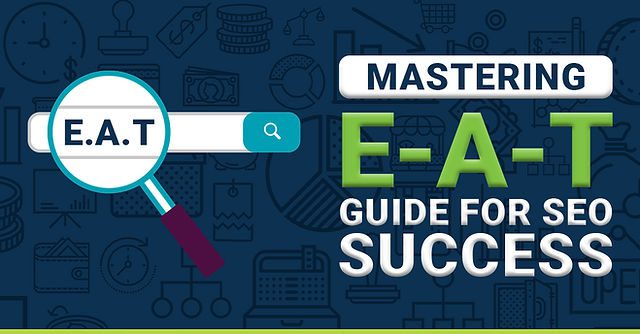
Mastering Content Optimization for Google’s E-A-T Algorithm
In today’s digital landscape, crafting high-quality, engaging content is paramount for achieving online success. With search engines constantly evolving, Google’s E-A-T algorithm—standing for Expertise, Authoritativeness, and Trustworthiness—has become a critical factor in determining the visibility and ranking of web pages. This guide delves into the strategies and best practices that can help content creators, marketers, and businesses alike to not only capture their audience’s attention but also to meet Google’s stringent criteria.
By understanding and implementing these principles, you can elevate your online presence, build credibility, and ultimately drive more traffic to your site. We explore the intricacies of content optimization, offering actionable insights to enhance your digital strategy and ensure your content stands out in an increasingly competitive online environment.
1 Understanding Google’s E-A-T Framework
Expertise
The knowledge and skill of content creators on the subject matter. Demonstrated through qualifications, experience, and depth of understanding.
Trustworthiness
The reliability and integrity of your content, ensured through accuracy, transparency, and security measures.
Why E-A-T Matters in 2024-2025
Google’s algorithm has evolved to place unprecedented importance on E-A-T signals, particularly for YMYL (Your Money Your Life) content—information that can impact users’ health, finances, or safety. The latest updates have made E-A-T evaluation more sophisticated, using AI to analyze multiple signals across your entire online presence.
74%
Higher click-through rates for websites with strong E-A-T signals compared to competitors with similar content quality
E-A-T Implementation Checklist
2 Developing Authoritative Content That Ranks
Content Quality Standards for 2024-2025
Creating authoritative content requires more than just good writing—it demands comprehensive coverage, original insights, and genuine expertise.
- Original Research: Conduct and publish your own studies, surveys, or data analysis
- Expert Interviews: Feature insights from recognized industry authorities
- Case Studies: Document real-world applications and results
- Comprehensive Coverage: Address topics thoroughly rather than superficially
- Visual Evidence: Include charts, graphs, and images that support your claims
- Updated Information: Regularly refresh content with current data and trends
Content Depth Requirements
Beginner Content
500-800 words, basic information, few sources, no original research
Low E-A-T Score
Intermediate Content
1000-1500 words, good research, expert quotes, some original insights
Medium E-A-T Score
Expert Content
2000+ words, original research, multiple expert contributions, comprehensive coverage
High E-A-T Score
3 Enhancing Website Trustworthiness Signals
Technical Trust Factors
Beyond content quality, technical elements play a crucial role in establishing trustworthiness:
- HTTPS Implementation: Full SSL certification with proper configuration
- Secure Payment Systems: PCI compliance for e-commerce sites
- Privacy Protection: GDPR/CCPA compliance and clear privacy policies
- Contact Transparency: Physical address, phone, and email verification
- Business Verification: Google Business Profile, BBB accreditation
- Update Frequency: Regular content updates and maintenance
Social Proof Integration
Review Schema
Implement structured data for customer reviews to enhance rich snippets and credibility signals.
Testimonial Display
Showcase verified customer testimonials with names, photos, and specific results.
Media Recognition
Display logos and links to reputable publications that have featured your work.
Certification Badges
Show industry certifications, security badges, and professional affiliations.
Trust Transformation Case Study
A financial advice website increased conversions by 320% after implementing comprehensive trust signals:
- Added detailed author bios with financial certifications
- Implemented transparent disclaimer and compliance statements
- Displayed secure connection badges and privacy certifications
- Added real client success stories with verifiable results
- Implemented review schema for all testimonials
4 UX Optimization for E-A-T Enhancement
User Experience as a Trust Signal
Google now evaluates UX elements as part of E-A-T assessment. Poor user experience can undermine even the best content.
- Mobile Optimization: Responsive design that works flawlessly on all devices
- Page Speed: Core Web Vitals optimization for fast loading
- Accessibility: WCAG compliance for users with disabilities
- Navigation Clarity: Intuitive menu structure and internal linking
- Content Readability: Proper formatting, headings, and scannable content
- Security Indicators: Visible security badges and trust seals
2.8x
Higher dwell time for websites with excellent UX compared to industry average, directly impacting authority signals
Essential UX Tools for E-A-T Optimization
Google PageSpeed Insights
Comprehensive performance analysis with specific improvement recommendations
Hotjar Heatmaps
Visual user behavior tracking to identify UX pain points
Accessibility Checker
Automated WCAG compliance testing and recommendations
Mobile-Friendly Test
Google’s official mobile optimization assessment tool
5 Building Authority Through Strategic Link Building
Quality Over Quantity: The 2024 Approach
Modern authority building focuses on earning high-quality links through genuine value creation rather than traditional outreach tactics.
- Expert Roundups: Collaborate with industry leaders on comprehensive content
- Original Research: Publish studies that other sites want to reference
- Resource Creation: Develop tools, calculators, or databases that fill industry gaps
- Guest Contributions: Write for authoritative publications as a subject matter expert
- Relationship Building: Develop genuine connections with industry influencers
- Broken Link Building: Provide superior replacements for outdated resources
Link Quality Assessment Framework
6 Content Creation & Optimization Framework
Comprehensive Content Development Process
Creating E-A-T optimized content requires a systematic approach from research to publication and beyond.
- Topic Selection: Choose subjects where you have genuine expertise
- Research Depth: Consult 10+ authoritative sources per article
- Expert Consultation: Interview at least one subject matter expert
- Content Structure: Use logical hierarchy and clear organization
- Visual Enhancement: Include original charts, infographics, or images
- Citation Management: Properly attribute all sources and data
- Quality Assurance: Fact-checking and peer review process
- Update Schedule: Plan for regular content refreshment
Content Optimization Checklist
Pre-Publication
- Expert review completed
- Sources verified
- Readability optimized
- Images optimized
Publication
- Author bio included
- Date published visible
- Schema implemented
- Social sharing enabled
Post-Publication
- Performance tracked
- Comments monitored
- Updates scheduled
- Links monitored
7 Ongoing Maintenance & Performance Tracking
Continuous E-A-T Improvement System
E-A-T optimization is not a one-time project but an ongoing process of improvement and maintenance.
- Regular Content Audits: Quarterly reviews of all high-priority content
- Author Profile Updates: Keep author credentials current and expanded
- Citation Tracking: Monitor where and how your content is referenced
- User Feedback Integration: Incorporate reader questions and comments into updates
- Performance Analysis: Track rankings, traffic, and engagement metrics
- Competitor Benchmarking: Compare your E-A-T signals against top competitors
- Algorithm Update Response: Adjust strategies based on Google’s changes
- Trust Signal Enhancement: Continuously add new credentials and recognitions
89%
Of websites with formal E-A-T maintenance programs maintain or improve rankings during algorithm updates
Essential Monitoring Tools
Google Search Console
Track search performance, impressions, and click-through rates
Ahrefs/SEMrush
Monitor backlink growth and authority metrics
Google Analytics
Analyze user behavior and engagement patterns
Mention/Brand24
Track brand mentions and citations across the web
E-A-T Optimization: The Path to Sustainable SEO Success
Mastering Google’s E-A-T algorithm is no longer optional—it’s essential for any website seeking sustainable visibility in search results. By focusing on genuine expertise, demonstrable authority, and unwavering trustworthiness, you create content that serves users while satisfying Google’s increasingly sophisticated quality evaluators.
Expertise is Demonstrated
Show, don’t just tell. Use credentials, experience, and comprehensive content to prove subject mastery.
Authority is Earned
Build reputation through quality content, strategic relationships, and industry recognition over time.
Trust is Built
Establish reliability through transparency, security, and consistent value delivery to your audience.
Maintenance is Essential
E-A-T optimization requires ongoing attention and adaptation to maintain and improve results.
The most successful websites in 2024-2025 aren’t just optimizing for algorithms—they’re building genuine authority and trust with their audiences. By implementing these E-A-T principles, you create a foundation for sustainable growth that withstands algorithm changes and builds lasting relationships with your audience.




